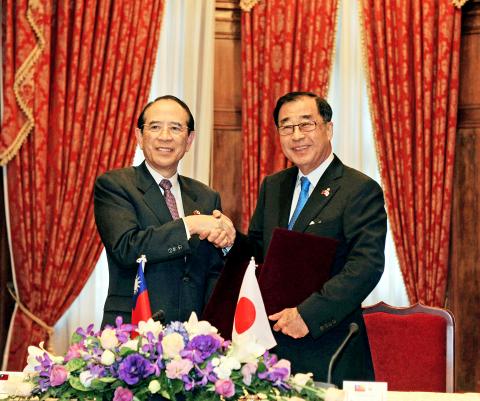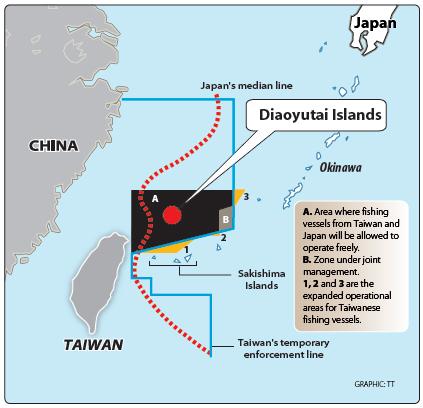|
Taiwan, Japan ink
fisheries agreement
DIAOYUTAI ISLANDS: Taipei pushed for the
inclusion of an escape clause stating that the pact does not have any bearing on
the two countries’ sovereignty claims
By Shih Hsiu-chuan / Staff reporter

Association for East Asian
Relations Chairman Liao Liou-yi, right, yesterday shakes hands with Interchange
Association, Japan Chairman Mitsuo Ohashi as they sign an agreement that defines
the two countries’ respective fishing rights near the Diaoyutai Islands at the
Taipei Guest House.
Photo: CNA

Taiwan and Japan yesterday inked a
fisheries agreement in a bid to end controversies over fishing in waters
surrounding the contested Diaoyutai Islands (釣魚台). The agreement includes an
escape clause which Taipei said allows both sides to set aside disputes over
their competing sovereignty claims.
The agreement assured Taiwanese vessels an intervention-free fishing zone in
waters between 27° north latitude and the Sakishima Islands, Okinawa Prefecture,
and gave Taiwan an additional fishing zone of 1,400 square nautical miles
(4,800km2) outside Taiwan’s temporary enforcement line, government officials
said.
Under the deal, fishing vessels from both countries can operate in a large area
within the designated zone without being subject to the jurisdiction of the
other side, while a smaller area of the zone, where Japanese fishing vessels
frequently operate, is under joint management by the two governments.
Provisions under the agreement do not apply to waters within 12 nautical miles —
a state’s territorial waters — surrounding the Diaoyutai Islands, because the
islands are claimed by both Taiwan and Japan, which calls them the Senkaku
Islands.
China also claims sovereignty over the Diaoyutais. Japan and China signed a
fisheries agreement in 1997, which took effect in 2000, under which both sides
co-manage waters above 27° north latitude.
At the signing ceremony at the Taipei Guest House, Association of East Asian
Relations Chairman Liao Liou-yi (廖了以) and Interchange Association, Japan
Chairman Mitsuo Ohashi hailed the agreement, which they said marked a big step
forward in bilateral relations.
The negotiations yesterday were the 17th round since talks started in August
1996.
Taipei and Tokyo initiated fishery talks following incidents of Taiwanese
fishing boats being seized, detained or expelled by the Japan Coast Guard after
Tokyo ratified the UN Law of the Sea Treaty in 1996 and set up a 200 nautical
mile exclusive economic zone that included waters surrounding the Diaoyutais.
Ohashi said it was “with great pleasure” that the deal was finally signed.
The primary goals were to “maintain peace and stability in East China Sea” and
to “strengthen the existing friendly relations with Taiwan,” he said.
At a press conference after the signing ceremony, Minister of Foreign Affairs
David Lin (林永樂) said that the agreement did not address the competing claims
over the Diaoyutais, as both governments agreed to “set aside the dispute.”
As stated in Article 4, provisions that both sides have agreed to under the deal
have no effect on each side’s sovereignty claims over the Diaoyutais, Lin said,
adding that the escape clause was written into the agreement at Taipei’s
insistence.
"We did not back down one bit over the sovereignty issue in the talks,” Lin
said.
Waters within 12 nautical miles surrounding the Diaoyutais were exempted from
the agreement because “we insisted that the area is our territorial sea, while
Japan upheld its position” that it is theirs, Lin said.
Coast Guard Administration Minister Wang Jinn-wang (王進旺) called on Japanese and
Chinese fishing vessels not to operate in waters within the 12 nautical miles
surrounding the Diaoyutais and vowed to adopt appropriate measures against
Chinese and Japanese fishing vessels to protect the rights of Taiwanese
fishermen.
Under the agreement, Taiwan and Japan also agreed to establish a fisheries
commission to discuss other issues, including the delineation of overlapping
waters in their respective exclusive economic zones above 27º north latitude and
waters south of Sakishima Islands, on an annual basis.
Meanwhile, China yesterday expressed concern about the new agreement.
“We are extremely concerned about Japan and Taiwan discussing and signing a
fishing agreement,” Chinese Ministry of Foreign Affairs spokesman Hong Lei (洪磊)
told a daily news briefing.
“We hope that Japan earnestly abide by its promises on the Taiwan issue and act
cautiously and appropriately,” she said.
Additional reporting by Reuters
History of negotiations
• First two rounds of negotiations, 1996: Both sides insisted on their
respective sovereign claims over the Diaoyutai Islands and did not have
substantial discussions about fisheries issues.
• Third round of negotiations, 1997: Working-level discussions began about
fishing grounds, but delimitation was not discussed.
• Fourth, fifth and sixth rounds of negotiations, 1998 to 2000: Taiwan proposed
that a commission be set up to co-manage fisheries in the area and that fishing
grounds be delimited based on “equitable principle.” Japan rejected the
proposals.
• Seventh to 15th rounds of negotiations, 2000 to 2005: Taiwan demanded
co-management of waters below 27o north latitude and that Taiwanese fishermen
have the rights to fish in waters between 27o north latitude to 29o18’ north
latitude, because this is within Taiwan’s Exclusive Economic Zone. Japan
rejected the proposal and wanted to negotiate based on the principle of a
“geographic median line.” It also rejected Taiwan’s claim to fish in waters
above 27o north latitude because the area was marked as a zone of joint control
between China and Japan in their bilateral fisheries agreement signed in 1997.
• Sixteenth round of negotiations, 2009: Consensus was reached on four general
principles to deal with disputes on fisheries issues. No substantial discussions
on delimitation were held.
Prepared by staff reporter Shih Hsiu-chuan
|
![]()
![]()
![]()